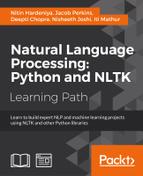 Singularizing plural nouns
by Iti Mathur, Nisheeth Joshi, Deepti Chopra, Jacob Perkins, Nitin Hardeniya
Natural Language Processing: Python and NLTK
Singularizing plural nouns
by Iti Mathur, Nisheeth Joshi, Deepti Chopra, Jacob Perkins, Nitin Hardeniya
Natural Language Processing: Python and NLTK
- Natural Language Processing: Python and NLTK
- Table of Contents
- Natural Language Processing: Python and NLTK
- Natural Language Processing: Python and NLTK
- Credits
- Preface
- 1. Module 1
- 1. Introduction to Natural Language Processing
- 2. Text Wrangling and Cleansing
- 3. Part of Speech Tagging
- 4. Parsing Structure in Text
- 5. NLP Applications
- Building your first NLP application
- Other NLP applications
- Summary
- 6. Text Classification
- 7. Web Crawling
- 8. Using NLTK with Other Python Libraries
- 9. Social Media Mining in Python
- 10. Text Mining at Scale
- 2. Module 2
- 1. Tokenizing Text and WordNet Basics
- Introduction
- Tokenizing text into sentences
- Tokenizing sentences into words
- Tokenizing sentences using regular expressions
- Training a sentence tokenizer
- Filtering stopwords in a tokenized sentence
- Looking up Synsets for a word in WordNet
- Looking up lemmas and synonyms in WordNet
- Calculating WordNet Synset similarity
- Discovering word collocations
- 2. Replacing and Correcting Words
- 3. Creating Custom Corpora
- Introduction
- Setting up a custom corpus
- Creating a wordlist corpus
- Creating a part-of-speech tagged word corpus
- Creating a chunked phrase corpus
- Creating a categorized text corpus
- Creating a categorized chunk corpus reader
- Lazy corpus loading
- Creating a custom corpus view
- Creating a MongoDB-backed corpus reader
- Corpus editing with file locking
- 4. Part-of-speech Tagging
- Introduction
- Default tagging
- Training a unigram part-of-speech tagger
- Combining taggers with backoff tagging
- Training and combining ngram taggers
- Creating a model of likely word tags
- Tagging with regular expressions
- Affix tagging
- Training a Brill tagger
- Training the TnT tagger
- Using WordNet for tagging
- Tagging proper names
- Classifier-based tagging
- Training a tagger with NLTK-Trainer
- 5. Extracting Chunks
- Introduction
- Chunking and chinking with regular expressions
- Merging and splitting chunks with regular expressions
- Expanding and removing chunks with regular expressions
- Partial parsing with regular expressions
- Training a tagger-based chunker
- Classification-based chunking
- Extracting named entities
- Extracting proper noun chunks
- Extracting location chunks
- Training a named entity chunker
- Training a chunker with NLTK-Trainer
- 6. Transforming Chunks and Trees
- Introduction
- Filtering insignificant words from a sentence
- Correcting verb forms
- Swapping verb phrases
- Swapping noun cardinals
- Swapping infinitive phrases
- Singularizing plural nouns
- Chaining chunk transformations
- Converting a chunk tree to text
- Flattening a deep tree
- Creating a shallow tree
- Converting tree labels
- 7. Text Classification
- Introduction
- Bag of words feature extraction
- Training a Naive Bayes classifier
- Training a decision tree classifier
- Training a maximum entropy classifier
- Training scikit-learn classifiers
- Measuring precision and recall of a classifier
- Calculating high information words
- Combining classifiers with voting
- Classifying with multiple binary classifiers
- Training a classifier with NLTK-Trainer
- 8. Distributed Processing and Handling Large Datasets
- Introduction
- Distributed tagging with execnet
- Distributed chunking with execnet
- Parallel list processing with execnet
- Storing a frequency distribution in Redis
- Storing a conditional frequency distribution in Redis
- Storing an ordered dictionary in Redis
- Distributed word scoring with Redis and execnet
- 9. Parsing Specific Data Types
- A. Penn Treebank Part-of-speech Tags
- 1. Tokenizing Text and WordNet Basics
- 3. Module 3
- 1. Working with Strings
- 2. Statistical Language Modeling
- Understanding word frequency
- Applying smoothing on the MLE model
- Develop a back-off mechanism for MLE
- Applying interpolation on data to get mix and match
- Evaluate a language model through perplexity
- Applying metropolis hastings in modeling languages
- Applying Gibbs sampling in language processing
- Summary
- 3. Morphology – Getting Our Feet Wet
- 4. Parts-of-Speech Tagging – Identifying Words
- 5. Parsing – Analyzing Training Data
- 6. Semantic Analysis – Meaning Matters
- 7. Sentiment Analysis – I Am Happy
- 8. Information Retrieval – Accessing Information
- 9. Discourse Analysis – Knowing Is Believing
- 10. Evaluation of NLP Systems – Analyzing Performance
- B. Bibliography
- Index
As we saw in the previous recipe, the transformation process can result in phrases such as recipes book. This is a NNS followed by a NN, when a more proper version of the phrase would be recipe book, which is a NN followed by another NN. We can do another transform to correct these improper plural nouns.
The transforms.py script defines a function called singularize_plural_noun() which will depluralize a plural noun (tagged with NNS) that is followed by another noun:
def singularize_plural_noun(chunk):
nnsidx = first_chunk_index(chunk, tag_equals('NNS'))
if nnsidx is not None and nnsidx+1 < len(chunk) and chunk[nnsidx+1][1][:2] == 'NN':
noun, nnstag = chunk[nnsidx]
chunk[nnsidx] = (noun.rstrip('s'), nnstag.rstrip('S'))
return chunkAnd using it on recipes book, we get the more correct form, recipe book.
>>> singularize_plural_noun([('recipes', 'NNS'), ('book', 'NN')])
[('recipe', 'NN'), ('book', 'NN')]We start by looking for a plural noun with the tag NNS. If found, and if the next word is a noun (determined by making sure the tag starts with NN), then we depluralize the plural noun by removing s from the right side of both the tag and the word. The tag is assumed to be capitalized, so an uppercase S is removed from the right-hand side of the tag, while a lowercase s is removed from the right-hand side of the word.
-
No Comment